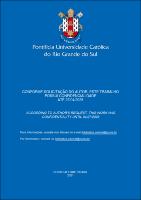| Share record |


|
Please use this identifier to cite or link to this item:
https://tede2.pucrs.br/tede2/handle/tede/9560| Document type: | Tese |
| Title: | Hegel e as bases do comunitarismo |
| Author: | Engelmann, João Gilberto  |
| Advisor: | Weber, Thadeu |
| Abstract (native): | O texto que desenvolvemos visa identificar a via mais indicada para atualizar a teoria social hegeliana. Tal busca recorre ao desenvolvimento do conceito de liberalismo em Hegel e da compreensão do status da liberdade individual na Eticidade. O trabalho desenvolve, inicialmente, o conceito de liberalismo em Hegel, face à ausência de uma delimitação aceitável desta noção. O delineamento deste conceito fez surgir a demonstração de que Hegel não pode ser considerado liberal apenas porque trabalha conceitos liberais, o que faz frente a problemas gerados por uma interpretação unilateral da obra hegeliana. O trabalho enfrenta, portanto, o problema da ausência de efetiva busca por aquilo que Hegel escreveu sobre o liberalismo e pelas consequências de tal omissão. O trabalho irá explicitar que a liberdade individual, para Hegel, não possui condições de se firmar como razão de ser da normatividade imponível a todos. Tanto do ponto de vista lógico, em que se radica o conceito de liberdade, quanto do ponto de vista dos desdobramentos práticos da vontade livre, os institutos histórico-culturais desenvolvidos por Hegel encontram-se na base do comunitarismo contemporâneo e permanecem aptos a subsidiar à nossa democracia plural elementos de estabilidade e desenvolvimento da liberdade o que, portanto, põe em evidência respostas comunitaristas, de matriz hegeliana, a estes desafios. O liberalismo é superado pela teoria social hegeliana, importante lastro teórico do comunitarismo, e a liberdade individual ganha concretude na liberdade da eticidade, em que se alia a mediações institucionais. Ao longo de todo o texto, há a demonstração de que a leitura de nosso sistema político pelo viés da teoria social hegeliana, e pelo comunitarismo que ela alimenta, revela uma via producente de lidar com os problemas mais candentes de nossas teorias da justiça, inclusive se mantivermos os elementos democráticos e o pluralismo. Por outro lado, revela a base hegeliana do comunitarismo e os desafios que este assume e, inclusive, como diverge desta origem em Hegel. O texto parte de um conceito de liberalismo em Hegel para evidenciar as deficiências desta noção trazidas pelo próprio Hegel, sedimentando, por fim, a lógica e consequente superação do liberalismo na consolidação da teoria social, fundamental base do comunitarismo, que é uma resposta mais concreta aos problemas contextuais de Hegel e, também, aos nossos. |
| Abstract (english): | The text we developed aims to identify the more indicated way to refresh the hegelian social theory. This goal uses the development of the concept of liberalism according to Hegel and a comprehension of the individual freedom into hegelian ethics. The work develops in a first step the concept of liberalismo according to Hegel, mainly because we have no acceptable sort of thing. Outlining this concept we were able to demonstrate that Hegel can not be considered a liberal thinker and this idea responds to the problems which resulted from a unilateral view on hegelian work. The text faces therefore the problem of the lack of a genuine research on the real hegelian view on liberalism and moreover the consequences of these omissions. We will make clear that individual freedom has no conditions to state itself as the reason for common rules which we could enforce to everybody. From a logical point of view, where is the concept of freedom, or even in a practical development of the free will, the social theory institutes stated by Hegel have more conditions to help our plural democracy and pluralism in order to provide stability and freedom capabilities. Moreover, we aregoing to state that the hegelian institutes are the basis of contemporary communitarianism and remain able to subsidize our democracies elements of stability and development offreedom. That shows the communitarianism answers, since hegelian basis, to our political challenges. Liberalism is overcome by a social theory, an important theoretical basis of communitarianism, and individual freedom gets more concretude in the ethics’s freedom in which we have institucional mediations. Along this text we demonstrate that reading our political system through a social theory, and according to the communitarianism that receives influences, way is useful to deal with the justice problems, even though we keep the democratic elements and pluralism. The text begins from a concept of liberalism to evidentiate the problems of that notion (liberalism) according to Hegel himself. That states the logical and consequente overcoming of liberalism by social theory, which is a more factual answer to Hegel and to our problems. |
| Keywords: | Comunitarismo Hegel Liberalismo Liberdade Individual Superação Hegel Liberalism Individual Freedom Overcoming |
| CNPQ Knowledge Areas: | CIENCIAS HUMANAS::FILOSOFIA |
| Language: | por |
| Country: | Brasil |
| Publisher: | Pontifícia Universidade Católica do Rio Grande do Sul |
| Institution Acronym: | PUCRS |
| Department: | Escola de Humanidades |
| Program: | Programa de Pós-Graduação em Filosofia |
| Access type: | Acesso Aberto |
| Fulltext access restriction: | Trabalho será publicado como artigo ou livro |
| Time to release fulltext: | 60 meses |
| Date to release fulltext: | 27/04/2026 |
| URI: | http://tede2.pucrs.br/tede2/handle/tede/9560 |
| Issue Date: | 25-Mar-2021 |
| Appears in Collections: | Programa de Pós-Graduação em Filosofia |
Files in This Item:
| File | Description | Size | Format | |
|---|---|---|---|---|
| TES_JOAO_GILBERTO_ENGELMANN_CONFIDENCIAL.pdf | JOAO_GILBERTO_ENGELMANN_TES | 422.28 kB | Adobe PDF |  Download/Open Preview |
Items in DSpace are protected by copyright, with all rights reserved, unless otherwise indicated.




